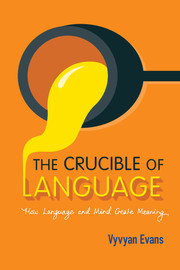Book contents
- Frontmatter
- Dedication
- Epigraph
- Contents
- List of figures
- List of tables
- Preface
- Acknowledgements
- I The ineffability of meaning
- II Meaning in mind
- Chapter 3 Patterns in language, patterns in the mind
- Chapter 4 Time is our fruit fly
- Chapter 5 Concepts body forth
- Chapter 6 The concept-making engine (or how to build a baby)
- Chapter 7 The act of creation
- III Meaning in language
- Epilogue: The golden triangle
- Notes
- References
- Index
Chapter 4 - Time is our fruit fly
from II - Meaning in mind
Published online by Cambridge University Press: 05 November 2015
- Frontmatter
- Dedication
- Epigraph
- Contents
- List of figures
- List of tables
- Preface
- Acknowledgements
- I The ineffability of meaning
- II Meaning in mind
- Chapter 3 Patterns in language, patterns in the mind
- Chapter 4 Time is our fruit fly
- Chapter 5 Concepts body forth
- Chapter 6 The concept-making engine (or how to build a baby)
- Chapter 7 The act of creation
- III Meaning in language
- Epilogue: The golden triangle
- Notes
- References
- Index
Summary
The sorts of experiences that we use to structure abstract ideas, according to Lakoff and Johnson, arise from our interaction in the world. They come from our experience of moving about in space, from picking up and putting down objects, and by bumping into things. They derive from giving objects to others, and from receiving things in return. It is these sorts of spatial experiences, they claim, that provide us with the inferential structure that makes up our understanding of abstract states like love, death, time and countless others. The truly radical idea at the heart of Conceptual Metaphor Theory is that abstract thought arises from our sensory–motor systems – our eyes, ears, pressure exerted on the skin, our felt sense of movement, our sense of balance, and so on. In short, so the claim goes, our experience of the spatial world provides the basis for the range of abstract concepts that comprise our conceptual systems, and which, accordingly, enable fundamental aspects of our meaning-making capacity – for instance, our ability to think about and externalise, in language, the range of abstract concepts that we express on a daily basis. In this chapter, I investigate this issue – whether more abstract concepts and domains are created by importing structure from our experience of space – by considering the domain of TIME. And in so doing, this will enable us to get a handle on the nature and origin of abstract concepts, with implications for our ultimate objective: to understand our human capacity for meaning. After all, my contention is that the human conceptual system – our repository of concepts, structured in part by conceptual metaphors – provides the basis for what language can be employed to encode and express in our everyday acts of meaning-making.
The reason for selecting time is that it amounts to the paradigmatic example of an abstract domain – time is presumably as abstract as you can get. We seem to experience time; yet there is nothing physical or concrete in the world, like stones and trees, that you or I can point to and identify as time. We sense its presence: we anticipate the future, which is distinct from the present we inhabit, and our recollection of the past. We even feel its effects on our own bodies as we age.
- Type
- Chapter
- Information
- The Crucible of LanguageHow Language and Mind Create Meaning, pp. 58 - 94Publisher: Cambridge University PressPrint publication year: 2015



